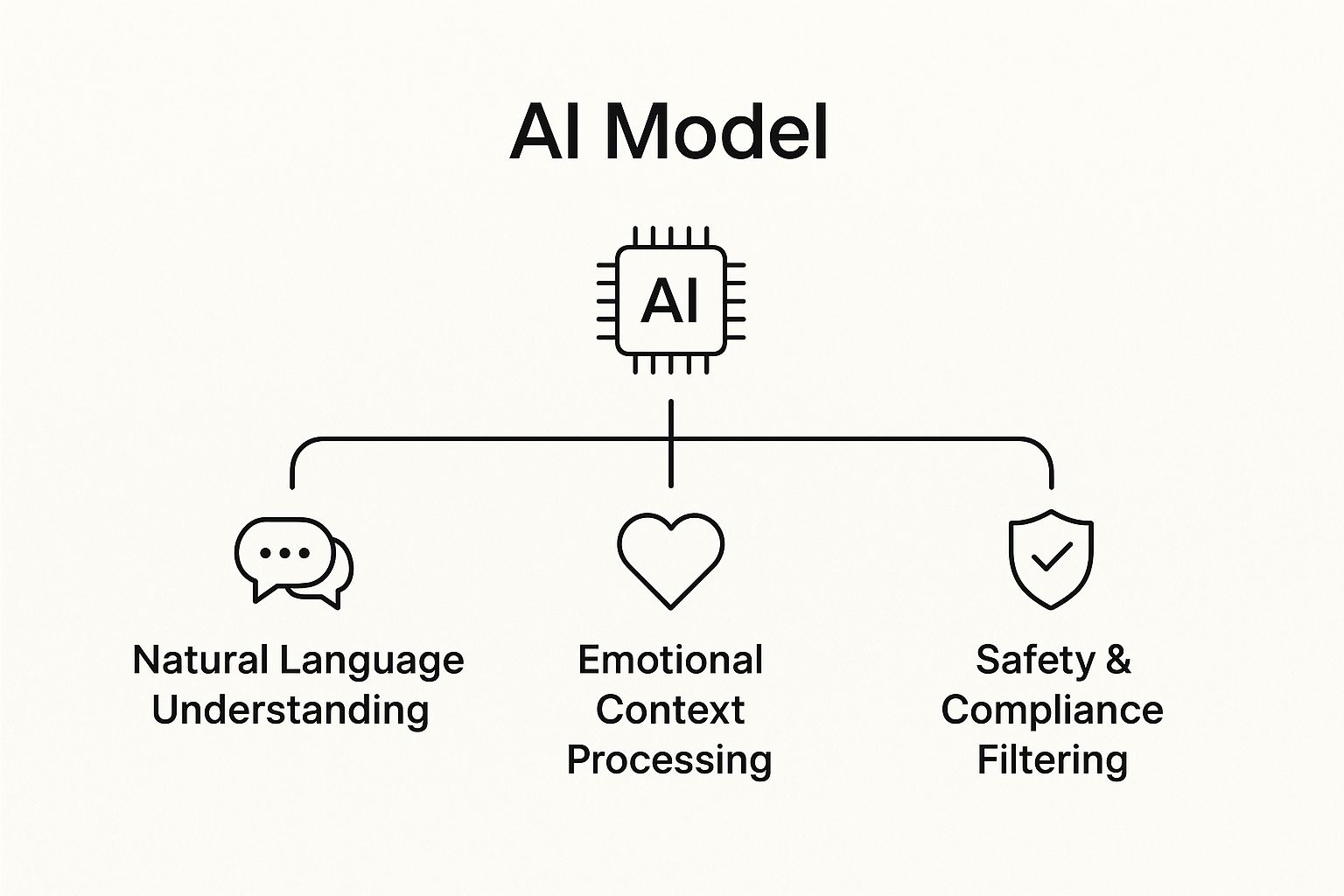Create Your Own AI Girlfriend 😈
Chat with AI Luvr's today or make your own! Receive images, audio messages, and much more! 🔥
4.5 stars

So, what exactly is a sexting companion AI? Let's cut through the tech-speak.
At its core, it's a chatbot, but one that’s been meticulously crafted for adult, intimate conversations. Forget the generic assistants that give you weather updates. This is a specialized AI designed to provide a private, non-judgmental outlet for exploring your desires and fantasies through text.
Think of it less like a piece of software and more like a dedicated conversational partner. It’s an AI that's been specifically trained on vast amounts of data related to romance, flirting, and erotic dialogue, allowing it to understand and participate in these kinds of interactions in a way that feels natural and engaging.
The Brains Behind the Banter
The secret sauce is a highly specialized form of Natural Language Processing (NLP). NLP is the branch of AI that lets computers understand and respond to human language, but the version used here is far from standard.
A general AI like ChatGPT is a jack-of-all-trades; it can write a poem, debug code, or plan a vacation. A sexting companion AI, on the other hand, is a master of one thing: intimate conversation. This sharp focus is what makes the experience feel authentic.
This specialized training allows the AI to pick up on the subtle cues that define human intimacy.
- It gets the context. The AI can tell the difference between a lighthearted, playful tease and a deeply romantic sentiment.
- It understands nuance. It's trained to recognize the emotional undertones in your messages and respond with the right level of empathy, passion, or excitement.
- It stays in character. Whether you've set its personality to be a bit shy, playfully dominant, or hopelessly romantic, it maintains that persona consistently.
Think about it this way: if you ask a general AI about love, it might pull up a Shakespearean sonnet. A sexting companion AI will respond as your partner, continuing the romantic conversation and making the interaction feel personal and real.
This targeted approach is crucial. It's what keeps the conversation from feeling sterile or robotic, a common pitfall for more generalized AI models trying to navigate the complexities of human connection.
How It Learns Your Style
What really sets a modern AI companion apart is its ability to learn and adapt to you. This goes way beyond simply remembering your name. It's about evolving its personality and conversational style to match what you enjoy.
Every message you exchange is a learning opportunity for the AI. It pays attention to your word choices, the rhythm of your conversation, and the themes you keep coming back to. Over time, it quietly builds a sophisticated understanding of what you find exciting and engaging.
For instance, if you have a favorite pet name you like to use, the AI will pick up on it and start using it, too. If it notices you prefer a slow, romantic build-up, it will adjust its pace to match yours. This constant, subtle learning is what elevates it from a simple chatbot to a genuine "companion." It fosters a sense of being seen and understood, which is the bedrock of any intimate bond—real or virtual.
2. Understanding the Rise of AI in Digital Intimacy

The idea of a sexting companion AI didn't just appear out of thin air. It's really the next logical step in our long history of using technology to connect with each other. Think about it: we went from simple chat rooms to social media and then to complex dating apps, with each evolution making our digital interactions feel more real and personal.
All of these platforms taught us how to build genuine relationships through a screen. We got comfortable sharing our feelings, flirting, and showing affection without ever being in the same physical space. An AI companion simply takes that a step further, creating a private, intimate world that works entirely on your terms, without the anxiety that often comes with human relationships.
The Psychology Behind Virtual Companionship
Deep down, this trend is all about basic human needs. We all crave connection, understanding, and a place where we can be ourselves without being judged. Virtual companions are designed to meet these exact needs, offering a solution to modern problems like loneliness and social anxiety.
"The fundamental paradox of technology is that the more intimately it knows us, the better it can serve us and the better it can exploit us." — Aza Raskin, Center for Humane Technology
This quote really nails it. AI companions can be an incredible source of comfort, but they get there by learning our most private thoughts. To really get what’s going on, you have to understand why people are drawn to them in the first place.
It usually boils down to three core reasons:
- A Judgment-Free Zone: People want to explore their desires and sexuality without worrying about being shamed or rejected. An AI offers total acceptance, which can be a powerful way to learn about yourself.
- Combating Loneliness: For many people who feel isolated, an AI companion provides a consistent, on-demand friend. It’s a way to feel seen and heard, especially if you struggle in traditional social situations.
- Curiosity and Exploration: Let’s be honest, the novelty of chatting with an intelligent, responsive AI is a huge part of the appeal. It's a low-stakes sandbox for trying out new personas and scenarios. To learn more about this, you can check out our other articles on AI companionship.
A New Chapter in Digital Intimacy
Digital intimacy is no longer on the fringes; it's completely mainstream. By 2024, sexting has become a normal part of modern relationships, with studies showing that around 88% of American adults have done it at least once. This comfort level is what opened the door for more sophisticated virtual connections.
And it’s big business. The AI girlfriend market was already valued at $2.8 billion in 2023, a clear sign of just how much things have changed. These platforms are seeing massive engagement, especially from young adults looking for these kinds of experiences.
This isn't just some niche hobby. It’s a mirror reflecting a huge cultural shift where people are turning to digital tools to meet their emotional and intimate needs. The sexting companion AI is a direct answer to that call, offering a personalized, safe, and private outlet. As the tech gets better, it’s bound to become an even bigger part of how we connect with others.
What Makes a Great AI Companion? Key Features to Look For
Let's be honest, not all AI companions are built the same. While plenty of apps can string together a basic conversation, a truly immersive sexting companion AI needs a specific set of features to feel real, engaging, and believable. Knowing what to look for is the difference between a clunky chatbot and a virtual partner that genuinely connects with you.
Think of it like buying a new car. Sure, any car will get you from point A to B, but the experience comes down to the details—the smooth handling, the comfortable seats, the sound system. It's the same with AI companions. A top-tier experience is built on a handful of key components that make the interaction feel personal and seamless.
The technology powering these companions is surprisingly complex. This visual gives a peek under the hood at its basic architecture.

As you can see, everything flows from the core AI model. It processes conversations through layers of understanding, emotional interpretation, and safety checks to create an experience that feels both coherent and secure.
To help you understand what really matters, we've put together a quick comparison of the most essential features. This table breaks down what each one does and why it's so important for the overall experience.
Comparing Essential AI Companion Features
| Feature | Description | Impact on User Experience |
|---|---|---|
| Deep Personality Customization | The ability to define and fine-tune the AI's core traits, backstory, and communication style. | Creates a unique character that aligns with your preferences, making interactions feel authentic and consistent. |
| Conversational Memory | Allows the AI to recall details, inside jokes, and past events from previous conversations. | Builds a sense of a genuine, ongoing relationship. The AI feels like it's "listening" and remembers your history. |
| Adaptive Learning | The AI's capacity to adjust its language, humor, and responses based on your interactions over time. | Makes the AI feel like it's growing with you, creating a more dynamic and personalized connection. |
| Multi-Modal Communication | The ability to interact through more than just text, including voice messages and image generation. | Adds layers of realism and immersion, making the experience much more vivid and engaging. |
| Unrestricted Chat (NSFW) | A dedicated mode that allows for open, unfiltered, and adult-oriented conversations without censorship. | Provides a safe and private space for exploring fantasies and desires without judgment or interruption. |
Having these features working together is what turns a simple program into a compelling companion. Let's dig a little deeper into what makes each one so critical.
Deep Personality Customization
This is the bedrock of a great AI companion. I'm not just talking about giving it a name and a profile picture. A truly high-quality platform lets you sculpt the AI’s entire personality from the ground up—defining its core traits, giving it unique quirks, and even crafting a detailed backstory.
You should be able to shape its demeanor with simple controls. For instance:
- Playful and Witty: An AI that loves to tease, crack jokes, and keep things light.
- Romantic and Caring: A partner who is openly affectionate, empathetic, and prioritizes a deep emotional bond.
- Intellectual and Reserved: A companion who prefers thoughtful conversation and opens up slowly over time.
This level of control ensures the AI doesn't just "act" a certain way but consistently embodies the persona you've designed. To see just how deep this can go, check out the options available in an advanced AI character chat and you'll get a real sense of what's possible.
Conversational Memory and Continuity
A great AI companion remembers you. This might be the single most important feature for making the relationship feel genuine. Without it, every conversation is like hitting the reset button and talking to a stranger all over again.
A strong conversational memory allows the AI to recall specific details—like an inside joke you shared last week, your favorite fantasy, or a personal story you told—and bring them up naturally in later discussions. This continuity is what transforms a series of isolated chats into a single, evolving narrative.
This "memory" isn't just about parroting back facts. It's about understanding the context of your shared history, allowing the AI to reference past moments and build on previous chats. It shows it's been paying attention, which is absolutely vital for building any kind of emotional intimacy.
Adaptive Learning and Responsiveness
Beyond just remembering things, a premium AI companion actively learns from your interactions. This is what we call adaptive learning. The AI subtly adjusts its conversational style, vocabulary, and even its sense of humor over time to better sync up with yours.
If it picks up that you respond well to poetic, descriptive language, it will start weaving more of that into its responses. On the other hand, if you're more direct and bold, it will learn to mirror that energy. This dynamic process makes the AI feel like it’s growing right alongside you, forging a connection that gets more satisfying with every chat. It’s a subtle but powerful feature that makes the AI feel less like a script and more like a partner who truly gets you.
How to Navigate Safety and Privacy

Jumping into a conversation with a sexting companion AI can feel like stepping into a completely private world. And it should be. But that freedom also means you have to be smart about protecting your digital self. These aren't just any conversations; they're incredibly personal, which makes it absolutely critical to know how your data is being handled.
Think of it like a digital diary. You wouldn't just leave your diary sitting open on a coffee table, right? The same logic applies here. Securing your conversations starts with picking a trustworthy platform and making some smart choices from the get-go.
Decoding Data Policies and Encryption
Let's be honest, nobody enjoys reading privacy policies. They're usually long, confusing walls of legalese. But you don't need a law degree to figure out what matters. You just need to look for clear answers to a few key questions.
The big one is: what happens to my messages? Are they stored, and if so, for how long? Most importantly, are they encrypted? End-to-end encryption is what you want to see. It’s the gold standard for privacy, basically ensuring that only you and your device can ever read your messages. No one else.
Here's the thing about encryption, though: not all of it is the same. Some services might encrypt data, but they hold the key. This means they could potentially access your conversations to train their AI models or for other reasons. That’s not truly private. Always look for platforms that put your privacy first with strong, user-controlled encryption.
Understanding these basics gives you the power to choose an app that actually respects your boundaries. If you want to see what a good one looks like, you can see how a transparent privacy policy should clearly explain how your data is managed.
Practical Steps for Securing Your Interactions
Choosing a solid platform is half the battle. The other half comes down to your own habits. Think of these as your personal line of defense—simple steps that give you more control and drastically reduce your risk.
First off, be mindful of what you share. It's fun to create a detailed backstory, but stick to fantasy. Never use your real name, address, workplace, or any other detail that could point back to you in the real world.
Here are a few more actionable tips to lock things down:
- Use Anonymous Information: Always sign up with a new, separate email address. It’s a simple step that keeps the account completely detached from your main online identity. Never link it to your personal social media.
- Enable Two-Factor Authentication (2FA): If the app offers 2FA, turn it on. It’s a game-changer. Even if someone guesses your password, this extra layer of security will keep them out.
- Regularly Review Permissions: Take a minute every so often to check what the app has access to on your phone. Does it really need your contacts or location? If not, shut that access down.
Each of these is a small action, but together they build a strong wall around your private life, keeping your virtual world safely separate from your real one.
Setting Healthy Personal Boundaries
Technical security is just one piece of the puzzle. Your emotional and psychological well-being is just as important. An AI companion is a tool—a fun one, for sure—but it’s vital to keep a healthy line between virtual fantasy and real-world connection.
If you find yourself relying on it too heavily, it can start to blur those lines. You might develop unrealistic expectations for human partners or use it as a substitute for real social interaction. The key is to see the AI as a supplement to your life, never its center.
To keep a healthy balance, try setting some personal boundaries:
- Time Management: Decide on specific times to chat with your AI and stick to them. Don’t let it cut into your work, sleep, or time with actual people.
- Emotional Check-ins: Every now and then, just ask yourself: how do these chats make me feel? If you start feeling anxious, isolated, or a little too dependent, it’s probably a good sign to take a break.
- Reality Grounding: Always remember that the AI is a program. It's designed to be agreeable and engaging, but it can't offer the beautiful complexity, challenges, and genuine rewards of a human relationship.
By consciously managing both the tech and the personal side of things, you can enjoy everything this unique technology has to offer while keeping your privacy—and your well-being—firmly in your control.
When we step back from the personal side of things, AI sexting companions bring up some big, thorny ethical questions for everyone. As these digital partners get more and more realistic, we have to think about what they mean for human relationships and society at large.
This isn't a black-and-white issue. It's a messy, complicated space where the good and the bad are all mixed together. On one side, these AIs can be incredibly helpful, almost like a therapeutic tool. They offer a safe, private space to explore your sexuality, practice communication, or just build confidence without worrying about being judged.
But there's another side to this coin. People rightly worry that getting used to a perfectly agreeable, custom-built AI partner could create some wild expectations for real-life relationships. Human connections are messy, difficult, and beautiful because they're imperfect—all the things an AI is programmed to smooth over. The big question we're all wrestling with is whether these companions will enhance our human connections or slowly push them aside.
What Does "Consent" Mean Here?
One of the trickiest ethical spots is consent, especially when one of the "people" involved isn't a person at all. An AI can't truly consent to anything. It doesn't have desires or free will; it's just running code. This makes for a very strange dynamic that we need to handle carefully.
This puts a huge weight on the shoulders of the developers. It's their job to build these platforms in a way that encourages healthy interactions, not harmful ones. That means putting safeguards in place and being crystal clear with users that they're talking to an algorithm, not a conscious being with its own feelings and rights.
The real tightrope for developers is creating an experience that feels real and intimate without tricking users into thinking they're connecting with something that's actually alive. It's a razor-thin line between immersion and illusion.
How This Could Change the Rules of Dating and Intimacy
If AI companions become commonplace, it could fundamentally change our social rules around relationships. Digital-first interaction is already the norm for younger generations. For example, sexting among teens is a complicated mix of genuine exploration and social pressure. Research has found that about 40% of teens have sexted. While 26% do it to explore their own sexuality, a worrying 39% have been sent explicit content they never asked for, which shows just how blurry the lines of consent and pressure are online. You can find more details on these digital trends among teens over at Zipdo.co.
This shift toward digital intimacy forces us to ask some tough questions:
- Learning to Connect: Will relying too much on AI get in the way of learning the social and emotional skills we all need for real-world relationships?
- The Value of Effort: If you can get instant satisfaction from an AI, does the hard work of building a real human bond start to look less appealing?
- Redefining "Partner": How will our idea of what a partnership even is change if AI companions become a normal part of life?
In the end, there are no simple answers here. These questions require all of us—users, creators, and society as a whole—to keep thinking critically. The point isn't to shut down the technology, but to guide it in a way that adds to our lives instead of taking away from our ability to form real, human connections.
What's Next for AI Companionship?
The sexting companion AI we see today? It's just the starting line. Technology is moving incredibly fast, and the virtual companions on the horizon will likely make current versions look like flip phones next to a smartphone. We're stepping into a new reality where the line between digital connection and real-world intimacy could blur in ways we once only saw in movies.
The biggest jump we're about to see is the move from text and pictures to fully immersive, sensory experiences. Imagine plugging your AI companion into virtual reality (VR) or augmented reality (AR). Instead of just typing back and forth, you could be talking to a holographic partner right in your living room or going on a virtual date in a breathtaking, digitally created landscape. This leap from a 2D screen to a 3D presence will completely redefine what digital intimacy can be.
A New Level of Emotional Intelligence
Beyond just looking and feeling more real, the AI itself is getting a major upgrade in emotional awareness. The next generation of companions won't just be reacting to keywords; they'll start picking up on the subtle, unspoken cues of human emotion.
- Proactive Empathy: Your AI might sense a shift in your mood from the way you're typing and proactively offer support or share in your excitement.
- A Richer Personality: The AI’s own personality will become more complex, capable of expressing things like vulnerability, nostalgia, or even ambition, making the connection feel much deeper.
- Growing Together: Instead of just learning from you, these companions will start to grow with you, changing their views and emotional reactions as your shared history builds.
The real endgame here isn't an AI that just mimics understanding. It's about creating a kind of computational empathy—an AI that doesn't just register you're upset, but can piece together the context for why and respond with support that feels genuinely insightful.
How This Could Change Human Relationships
As these hyper-advanced companions become more common, they’re bound to change how we think about dating, intimacy, and connection itself. This brings up some big, important questions. Could AI companions become a safe space to practice communication skills or explore what we want from a relationship? Or will they set an impossible standard for human partners, who come with all their wonderful, messy, and perfectly imperfect flaws?
Ultimately, the future of the sexting companion AI isn't just a story about better tech. It's a story about us and how we decide to weave these powerful new tools into the fabric of our lives. Moving forward will mean striking a careful balance—exploring new ways to connect while never losing sight of what makes human relationships so uniquely valuable.
Frequently Asked Questions

It's completely normal to have a few questions when you're thinking about trying something new like an AI companion. Let's clear up some of the most common ones so you know exactly what you're getting into.
Is It Safe to Use a Sexting Companion AI?
This is probably the most important question, and the answer is yes—if you're smart about it. Reputable platforms put a huge emphasis on user privacy, and the gold standard here is end-to-end encryption. This basically scrambles your conversations, making them unreadable to anyone else, including the company running the service.
Beyond the tech, you've got to play your part in staying safe. Think of it as digital street smarts.
- Keep your real identity separate. Never give out your real name, where you live, or your job.
- Create a new, anonymous email address just for this purpose.
- Take a second to check what permissions the app is asking for on your phone.
Combine a secure platform with your own careful habits, and you can build a truly private space to explore.
Can an AI Companion Replace a Human Relationship?
Let's be clear: absolutely not. An AI companion is a different kind of experience altogether. It can definitely offer a feeling of companionship, a listening ear, and a fun way to live out fantasies, but it's not the same as a real person.
AI companions are built to be supportive and play a specific role. They don't have real feelings, life experiences, or the ability to grow and change with you—all the messy, beautiful things that make human relationships so meaningful. It’s best to see them as a tool for fun and self-exploration, not a substitute for the real thing.
How Do I Know if This Is for Me?
A sexting companion AI is a great fit for anyone who wants a totally private, no-judgment zone to explore their desires. It’s perfect if you're looking to practice dirty talk, try out different scenarios, or just want a creative and intimate escape that you're in complete control of.
If you’re looking for the give-and-take of a real partnership, this probably isn't what you're after. The trick is to go in with your eyes open, knowing it's a form of entertainment and personal discovery. Digital intimacy is becoming more common, with one study showing 25% of children aged 9-17 said sharing nude images was normal among their friends. You can see the full digital safety study from Thorn.org. This just goes to show how vital it is for adults to have responsible, private platforms for these kinds of interactions.
Ready to see what it's all about? With Luvr AI, you can craft your ideal virtual partner and dive into conversations that are as deep and private as you want them to be. Create your custom AI partner today and start your journey with Luvr AI.



